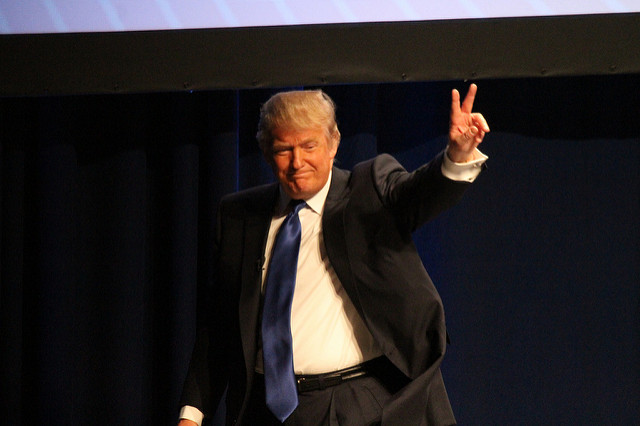Trump’s maternity leave proposal is nothing short of ironic
Republican presidential nominee Donald J. Trump is notorious for changing his mind — from his stance on immigration, to the Iraq war, even when it comes to his opponent, who he refers to as “Crooked” Hillary Clinton.
This time, Trump is retracting his position on working mothers by roping in his businesswoman daughter, Ivanka Trump.
Ivanka Trump, clothing designer and initiator of the #WomenWhoWork movement, has not been known for having the best policies when it comes to her own company policy on family leave. In recent months, her company has come under fire for shifty business practices involving her clothing manufacturer’s policy on maternity leave.
Despite the controversy, Ivanka Trump helped her father design a maternity and child care proposal, which was presented to the public last Tuesday in Philadelphia.
It’s hard to believe that the presidential candidate would be interested in making life better for working mothers.
In a 1994 interview with ABC News, Trump said “putting a wife to work is a dangerous thing.”
Ten years later, in an interview with NBC’s Dateline, Trump said that pregnancy was “certainly an inconvenience for business.”
Not only does Mr. Trump consider pregnancy a burden for business, but he also does not appear to be supportive of working mothers making a conscious effort to balance work and family life.
According to a 2011 report from CNN, Trump had a hissy fit when one of his lawyers requested to leave the room when she needed to pump breastmilk.
In an attempt to win over about half the electorate— women— Trump is making a last-ditch effort by proposing this policy.
Trump’s child care policy would include six weeks of paid maternity leave — a few steps above the Family and Medical Leave Act, which allows for 12 weeks of unpaid leave. Mothers would be eligible for the plan only if their current employer does not already offer paid maternity leave.
Trump’s plan would entail using the country’s current tax code in order to benefit families.
To sum it up, this is his plan:
People making under $250,000 a year would be allowed to make child care deductions and couples making under $500,000 would also be able to deduct child care expenses.
If a parent chooses not to return to work, they would also be allowed to make deductions.
For low to moderate income families, Trump’s plan would offer spending rebates through the Earned Income Tax Credit, which fluctuates depending on the number of children they have.
Trump is also proposing the creation of “dependent care savings accounts,” which would allow families to set aside money to aid with any dependents they may have, helping with child or parental care.
These savings accounts would allow for tax-deductible contributions, and would be applicable to traditional child care, after-school programs and school choice. When it comes to the elderly, the accounts may be applied to in-home care and nursing care.
Despite Trump’s past remarks about women and working women, it seems he is breaking away from the traditional Republican party platform by bolstering social programs in the United States.
The closest maternity leave policy that the United States has implemented is the Family and Medical Leave Act, which was signed into law by President Bill Clinton in 1993. The legislation applies to businesses with 50 or more employees.
Though the Family and Medical Leave Act is successful in providing leave in general, the unpaid aspect of the FMLA puts women behind in the workforce. Having no paid maternity leave may contribute to the wage gap women face, according to a 2013 Pew research study.
Providing paid maternity leave is believed to reduce the need for government assistance, according to a study done at Rutgers University.
Not only does paid maternity and family leave help women and families financially, it also benefits their overall wellbeing. A study published in 2014 indicated women who received substantial maternity leave were less prone to developing postpartum depression.
Although the plan does not address the need for paternity leave, the business mogul-turned politician may be onto something.
If he really does “cherish women” like he claims he does, then it would be in his best interest to push this policy forward and try to win over a big portion of the electorate that he has thus far isolated.
Email Amy at [email protected] or follow her on twitter @AmyFRusses.

"The greater our knowledge increases the more our ignorance unfolds."










